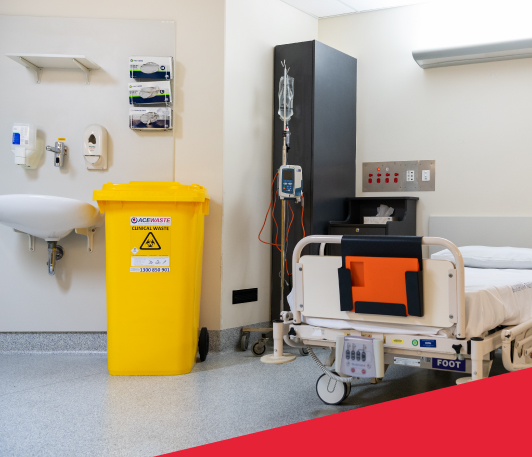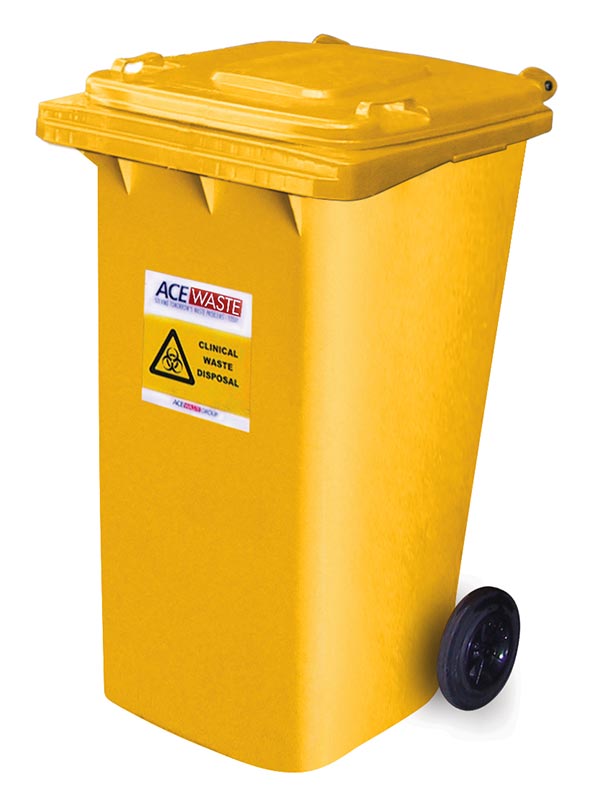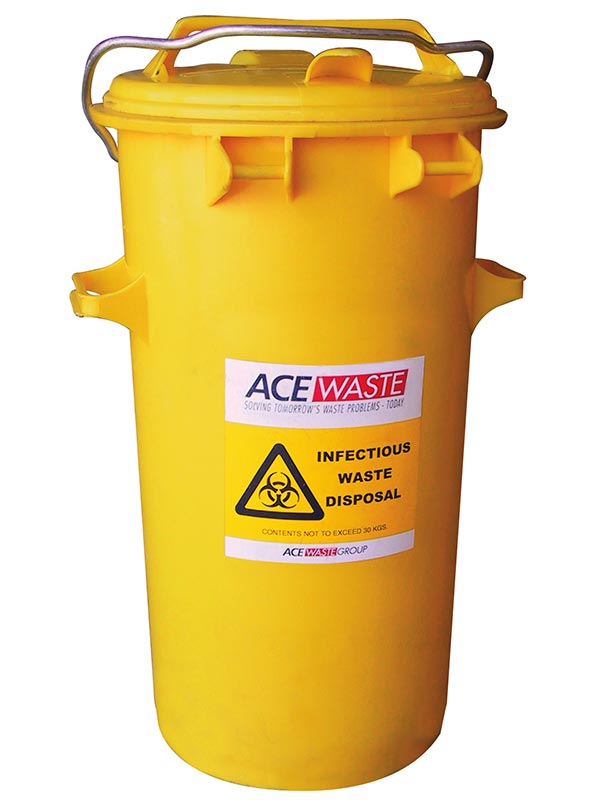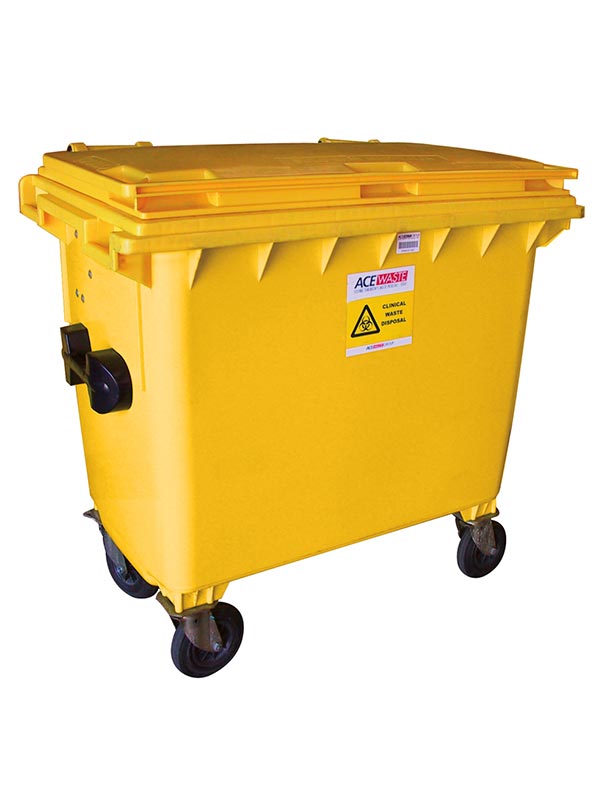
CLINICAL WASTE DISPOSAL
Whether you run a medical practice, a hospital, an aged care facility, or something similar, one thing remains constant: the need for trustworthy and compliant Clinical Waste Disposal services. Clinical waste is defined as any material that has the potential to cause disease. It is sometimes referred to a ‘medical waste’ depending on where you’re located and includes:
- Human tissue waste or body parts
- Discarded sharps
- Laboratory waste
- Cytotoxic drugs
- Pharmaceutical products
- Radioactive substances
Ace Waste is the leading clinical waste disposal service in both Brisbane and Melbourne. Our comprehensive clinical waste management and disposal services align seamlessly with Queensland and Victoria’s licensing requirements and codes of practice. Moreover, our cutting-edge incineration facilities create 90% less landfill waste than basic treatment and landfill solutions, transforming all Clinical Waste into renewable energy.
Safe, secure & cost-effective Clinical Waste Disposal
Clinical waste disposal, including specific categories like COVID-19, sharps, or dental waste, is governed by strict regulations, and violations can result in hefty fines. Ace Waste’s advanced, EPA-approved incineration facilities and processes ensure the complete destruction of all infectious material while abiding by your state regulations.
Clinical waste must also be segregated and stored in specific clinical waste bins. Ace Waste offer a wide range of sturdy, colour-coded bins – check them out below.
We take great pride in developing bespoke resolutions for all healthcare practices, big and small. The primary way we do this is via a comprehensive waste audit. A waste audit allows us to fine-tune your management strategies, ultimately lowering operational expenses and enhancing compliance and sustainability practices. To gain peace of mind and enhance facility operations, enquire about our Clinical Waste Disposal today!
Clinical
WasteLooking at it more in-depth, clinical waste disposal deals with the following:
- waste produced by medical, nursing, dental, veterinary, laboratory, pharmaceutical, podiatry, tattooing, body piercing, brothels, emergency services
- blood banks
- mortuaries and other similar practices, and
- wastes generated in healthcare facilities or other facilities during the investigation or treatment of patients or research projects.
DOWNLOAD CLINICAL WASTE FACT SHEETSharps
WasteAs a type of biomedical/biohazardous waste, the categorisation of sharps waste is a distinction under the umbrella term clinical and related waste; referring to any device or object used to puncture or lacerate the skin. It is possible for this type of waste to spread harmful blood-borne pathogens (should contaminated sharps pierce the skin). The safe use and disposal of sharps requires sharps disposal training and sharps container disposal using specialised medical sharps disposal services, like what is provided at Ace Waste.
The types of medical materials that are commonly treated as sharps waste include needles, scalpels, blades and anything attached to them (such as syringes and injection devices).
Glass items and sharp plastics that have been contaminated with biohazardous materials also fall into this category, as do many types of cutting implements used in a medical setting, such as razors or scissors.
FULL INFORMATION ON SHARPS WASTEPharmaceutical
WasteThe pharmaceutical waste stream deals with drugs/medicines, vaccines, remedies of other pharmaceutical products (other than scheduled and dangerous goods). These items (and their by-products) may have expired, may no longer be required, or may have been recalled/overrun. This also includes the raw material generated during manufacture and any residual, spilt or broken materials of a pharmaceutical nature.
Examples of pharmaceutical waste include vials and containers (full, partly empty or used), prescription medications (capsule or tablet), controlled drugs, ampoules, needles, connecting tubing and general pharmaceutical products.
PHARMACEUTICAL WASTE FULL INFORMATIONCytotoxic
WasteThis type of waste refers to any material contaminated with residues or preparations that are toxic to cells. This type of waste is generally produced by medical and related industries. The harmful nature of these materials means that suitable and stringent safety precautions related to handling, storage, segregation, transport and disposal must be adhered to at all times.
Legally, cytotoxic waste must be incinerated by a licensed authority and all parties who come into contact with the material should be monitored regularly for compliance.
Amounts of (or traces of) cytotoxic waste are typically found in (but are not limited to):
- Gloves
- Masks
- Gowns
- Swabs
- Sharps (needles/syringes)
- Urine and faeces
CYTOTOXIC WASTE FULL INFORMATIONSanitary
WasteSanitary waste doesn’t just include hygiene products like used sanitary napkins and diapers. Waste that falls under this category also can relate to bandages, plasters, catheters and even hospital gowns. Plus, any other materials contaminated with blood and/or other types of bodily fluids and solids.
Forms of sanitary waste commonly include:
- human and animal produced waste
- incontinence pads
- nappies
- condoms
- catheter and stoma bags
- soiled bedding from a non-infection source
- nasal secretions.
Ace Waste provides innovative solutions for your clinical disposal needs
Learn more about our process and points of difference.

Industries we work with
Doctor and GP Practices
Pharmaceutical Industries
Tattoo Parlours
Beauty Clinics/Shops
Schools
Frequently Asked Questions
Still have some queries? See if we can help answer some of them.
How does your clinical waste service work?
Our service process is quite simple: we supply the waste containers and collect them as per the agreed schedule. We will then dispose of them in our incineration facility, where all waste will be completely destroyed.
Can I bring clinical waste to your facility for disposal?
Ace Waste currently provides a full clinical waste collection and disposal service for our clients. If you would like to discuss options regarding the disposal of waste please contact our team at your nearest facility to discuss.
Please see our Contact Us page for more details.
Can I use my own bin?
Ace Waste will supply any necessary bins and containers for the safe disposal and collection of the clinical waste.
Please also see our full list of Clinical waste disposal bins.
Does the Ace Waste driver decant the waste from the bin?
Ace Waste provides an exchange service for all waste containers. In this process, all supplied waste containers are brought back to our facility for weighing, emptying and disposal of the waste material. The containers are then cleaned prior to being returned.
Please see our list of available Waste disposal services.
Do I need an account?
Ace Waste offers pay in advance/cash sale options for everything except ongoing services relating to Ace’s assets. Talk to our team and we can find a flexible solution for you.
Can I dispose of Sharps Containers purchased elsewhere?
Yes, all sharps containers can be collected and disposed of by Ace Waste. Sharps containers can also be placed into Ace Waste supplied Clinical Waste bin to ensure the safe collection, transport and disposal of the waste.
Ace Waste can also supply new containers at the time of service. Please see our list of available Products.
Is there a minimum contract?
There are no minimum contracts when it comes to working with Ace Waste.
Please Contact Us for any enquiries you might have.
Can I pay using a credit card?
Ace Waste provides the ability to pay using credit card. Please contact our team to assist with your payment. Unfortunately, we do not accept American Express cards (AMEX).
Please see our Contact Us page for details.
READY TO ENQUIRE?
Simply fill out the form or give us a call to obtain a quote or get more info on any of products and services.
Monday - Friday, 9AM - 5PM
Servicing Victoria
and Queensland
"*" indicates required fields



